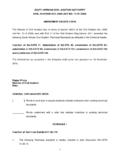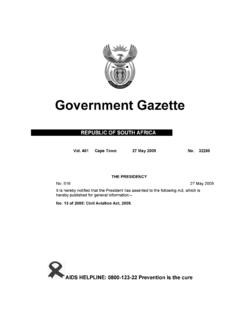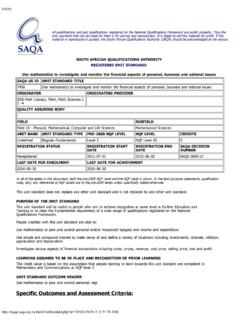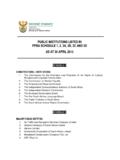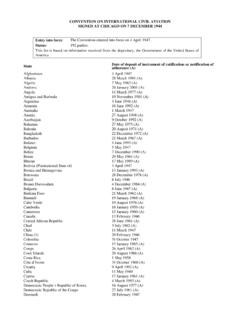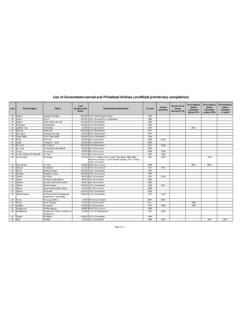Transcription of THE SUPREME COURT OF APPEAL OF SOUTH AFRICA
1 THE SUPREME COURT OF APPEAL OF SOUTH AFRICA MEDIA SUMMARY OF JUDGMENT DELIVERED IN THE SUPREME COURT OF APPEAL FROM The Registrar, SUPREME COURT of APPEAL DATE 25 March 2015 STATUS Immediate Please note that the media summary is for the benefit of the media and does not form part of the judgment. Neutral citation: The SOUTH African Hang and Paragliding Association v Bewick (25 March 2015) MEDIA STATEMENT Today the SUPREME COURT of APPEAL upheld the APPEAL in this matter against the judgment of the Western Cape High COURT , Cape Town.
2 The first appellant was the SOUTH African Hang and Paragliding Association (SAHPA) while the second appellant was the SOUTH African Civil Aviation (SACAA) The respondent was Mrs Diane Bewick, a radiographer from Tyneside in the United Kingdom. During 2004 she spent the Easter holiday in Cape Town with her husband, who was then her fianc . One evening over dinner she expressed an interest in taking a tandem paragliding flight.. One of her friends then made the necessary arrangements with entities that offered such flights for reward.
3 So it happened that on Monday 12 April 2004 the respondent and her group were picked up from their hotel in Cape Town. They were driven out to Hermanus in a minibus. The respondent was paired with a very experienced paragliding pilot. Unlike a hang-glider, a paraglider has no fixed frame, and is more akin to a parachute. With a tandem paraglider the passenger is positioned in front and slightly lower than the pilot. The respondent and her pilot took off from the launch site on a hillside outside Hermanus.
4 Just after take-off, the paraglider experienced a so-called wing collapse which affected its manoeuvrability and caused it to lose height. In consequence, the pilot swung the paraglider back towards the hillside in an attempt to keep it aloft. From the position where she was sitting, the respondent thought that she could cushion the blow of the impending collision by putting her feet out. She obviously did not realise the speed at which they were already travelling. When her feet hit the hillside, she broke both her legs and also her spine.
5 In consequence, she spent many 2 2 months in hospital, first in Cape Town and then in England. Eventually her injuries left her paralysed in a wheelchair. Resulting from these tragic events, the respondent instituted action in the Western Cape Division of the High COURT in which she claimed damages, in the pounds sterling equivalent of about R25 million, from six defendants. The first defendant was the pilot, the second and third defendants were his employers with whom she had contracted to take the tandem flight for reward.
6 The fourth and fifth defendants were SAHPA and SACAA. while the sixth defendant was the Department of Transport. Shortly before the commencement of the trial, however, the respondent settled her case against first, second and third defendants and withdrew her claim against the sixth. In consequence the trial proceeded solely against the two appellants. The respondent s case against the two appellants was based on the following propositions: (a) Paragliding within SOUTH AFRICA fell under the direction and control of the two appellants.
7 (b) Tandem paragliding for reward was illegal and the two appellants were aware that this illegal activity was going on. (c) The two appellants were under a legal duty to take reasonable steps to terminate and prevent this illegal activity, but had failed to do so. (d) Had the appellants done so, the flight during which the respondent sustained her injuries, would not have occurred. The high COURT held for the respondent. On APPEAL , the SCA held, however, that even if paragliding for reward were illegal, it would not be reasonable to impose delictual liability on the two appellants for the harm suffered by the respondent.
8 In consequence the APPEAL was upheld.










